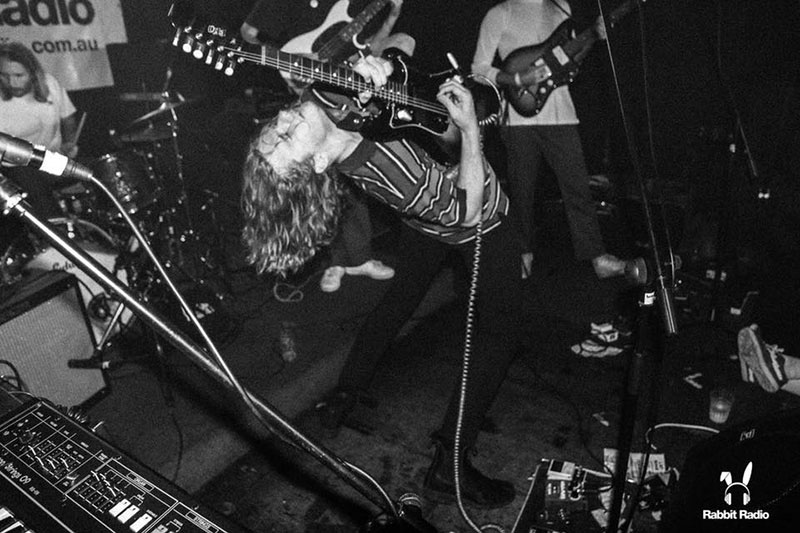Camp Cope + Chastity Belt
Thornbury Theatre, VIC
The Jim Mitchells
The Tote, Collingwood, VIC
Thursday, March 15, 2018
Upon entry the facilitator, a corporate social psychologist from Central Casting - soft tones, placating language punctuated with references to some ground-breaking American study - makes deliberate eye contact with each of us as we enter, and again as he introduces the day.
We’re seated in a circle to create the appropriate group dynamic. When we’re invited to make our opening comments, I’m tempted to invoke a tired joke: ‘Hi, I’m Patrick, and I’m an alcoholic. Sorry, wrong meeting.’ Wrong crowd, don’t go there.
My colleagues are all pleasant people, different personalities, varying degrees of tolerance for this sort of conflab. But that’s hardly a revelation. Everyone plays the game, with varying degrees of success. The atmosphere is convivial, and we spend much of the first day collectively and individually grasping for a purpose and a tangible outcome. The discourse is corporate psychology speak: it’s about the sense of self in a group, about understanding your ‘chatter’ (apparently ‘chatter’ are examples of ordinary human foibles, and which can debilitate your productivity if not confronted).
There are new words introduced into an already cluttered vocabulary: "leaderful" means exercising leadership, but (I guess) without the exploitative connotation of the word that is actually recognised in the dictionary. "Agentic" sounds like a term left on the floor after a brain-storming session in the marketing division of a pharmaceutical company. It just means contributing constructively to a group discussion or project.
The modus operandi of these events is standard: elicit honest observations from all participants, identify differences in perspective, confect a superficial level of confrontation, identify means by which confrontation can be harnessed for a greater (corporate) good and avoid physical or psychological abuse.
By the end of the day we’ve been asked to identify what we can each sacrifice to help the cause. I offer up my ingrained suspicion of social psychology as a discourse of truth, but in all honesty, I can’t do that, anymore than I can look someone in the eye and tell them Ed Sheeran is a better songwriter than Spencer Jones.
A group of my colleagues convenes in the bar to have a drink and ponder the progress of the course. Thinking strategically, and knowing my limitations, I’ve already organised to go to see Camp Cope at Thornbury Theatre.
Camp Cope is arguably the most important independent band in the Australian music scene currently going around. That’s the not the same as being "the best".
Camp Cope is important because the represent a disturbance to the prevailing power structure of the music industry, from the obvious sexism of leering and groping managers and executives, to the insidious misogyny of venues, festivals and industry protagonists. It’s the punk rock anger of Bikini Kill mixed with the intellectual ferocity of Andrea Dworkin, conveyed with the pop sensibility of The Go-Gos. Rock’n’roll exists to disturb the dominant political order. And long may it do so.
US band Chastity Belt is mid-way through their set when I arrive. Chastity Belt play comfortable, melodic pop, somewhere in the realm of The Lemonheads at Evan Dando’s most opiated level. The crowd is dotted with the gender identity soup that freaks conservative media commentators to their core. Heavily tattooed androgynous 20-somethings arm-in-arm, serious expressions, more mullets than I’ve seen since the Princess Berkley Hotel in Hindley Street in 1989. Every personal interaction might be a potential statement of the political.
Camp Cope comes on stage just after 9.30, provoking an excited cheer from the crowd. The music is sharper than Chastity Belt, the melodies more refined, the discursive power of the lyrics more overt. It’s not as in-your-face as Cable Ties, nor as pop-song-perfect as RVG (whose brilliant debut album was played between acts), but is, to invoke the corporate vernacular, engaging.
Everyone plays at a safe and respectful distance. Which shouldn’t be be difficult, but tell that to an inebriated male acting under a heavy dose of testosterone.
Earlier in the day our course facilitator acknowledged the existence of power, but then seemed to wish it away as if it was an annoying itch. "Leaderful behaviour does not need to be an exercise of power," he’d contended. That’s a misconstruction of the nature of power, I muse to myself, while deciding I won’t be dragged in to play the "honesty-confrontation-reconciliation" game.
Camp Cope sees power for what it really is, a myriad of complex and exploitative relationships perpetuated by entrenched institutional hierarchies and marginalising discourse. And they’ve got a great set of songs, which is more than I could say that the latest schmuck gracing the pages of the Harvard Business Review.
"The Opener", the opening track from Camp Cope’s latest album, a barbed analysis of sexist behaviour, concludes the set. The lights come on and the evening’s entertainment is over. It’s only 10.30pm, and to quote a friend of mine 30 years ago, the night is but a foetus. I jump on my bike and ride to The Tote, in time to see Sydney garage-psych band The Jim Mitchells.
They’re supposed to be on at 11, but it’s closer to 11.30 by the time the first chord is strummed in anger. And it’s a good, chord, too.
 The Jim MItchells. Photo from the band Facebook.
The Jim MItchells. Photo from the band Facebook.
Every song has a hook strong enough to hang a 20-tonne truck. The mood ebbs and flows, from the lilting country-tinged beauty of Country Joe and the Fish, to the raucous garage insanity of The Seeds, to the sparking pop of Dolly Rocker Movement.
Earlier in the day our course facilitator had exhorted us to "get off the dance floor and look down from the balcony". Like so many corporate-speak metaphors, it was specious, verging on laziness, probably conjured up originally by a middle-aged academic who hadn’t been on a dance floor since he did the white-boy shuffle to Billy Ray Cyrus in 1989.
Mid-way through set I looked across the crowd, barely 30-strong. Everyone was grooving to the music, some independently, some in concert with friends and strangers alike. The love is in the air. You can be on the dance floor and watching the patterns at the same time. Binary analysis is cheap and unhelpful. As George Clinton said, free your mind and your ass will follow.
It’s past midnight and we could have all stayed in the moment for another hour, or even longer. Five hours later I’m up, preparing school lunches for my children, starting the difficult journey from psychedelic awareness to corporate banality.
The second day of the course starts with self-reflection. What did we learn about ourselves, and the other people in the group, our facilitator asks? The group therapy session is on in earnest. At 9.45 I decide I’ve switched off from the discourse. In three hours the night before, there was more significant, more telling, more provocative statements of power, resistance and social cohesion than any social psychologist could ever realise.
Rock’n’roll is real, the rest of this shit is just a game.

 Camp Cove.
Camp Cove.